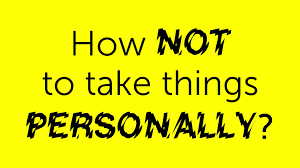If you’re currently feeling a little emotionally overwhelmed, this article is for you. We all have those moments where we take things personally and feel as though someone’s words or actions are directed at us. In reality, the person may not be thinking of us at all! This can lead to feelings of anger, sadness, or frustration. In this blog post, I will discuss why we should not take things personally and offer ways to avoid doing so in our day-to-day life.
Contents
Understanding The Psychology Of Taking Things Personally

When someone says or does something that we perceive as negative, our first reaction is often to take it personally. We may feel as though the person’s words or actions are a direct attack on us.
This knee-jerk reaction is quite common and can be traced back to our evolutionary history. Our ancestors would have needed to quickly determine whether a situation posed a threat to them. If they didn’t take things personally, they could be putting themselves in danger.
While this reaction is helpful in some cases, it can also lead to problems. For example, we may feel as though we are constantly under attack and become defensive. This can damage relationships with the people around us. Additionally, we may become so wrapped up in our own emotions that we can’t see the situation objectively.
Why Do We Take Things Personally?
There are several reasons why we take things personally. Here are some common explanations:
- One reason is that we want to feel as though we’re important and that people care about us. When someone says or does something hurtful, it can feel as though they’re trying to devalue us.
- Another reason is that we may have low self-esteem. We may believe that if someone doesn’t like us, there must be something wrong with us. This can lead to a lot of anxiety and insecurity.
- We may be scared (of being judged) that if someone doesn’t like us, there’s something wrong with our character or appearance. Our insecurities can also lead to taking things personally when the other person is feeling stressed out about their life circumstances.
Signs That You Take Things Personally

It can sometimes be difficult to know whether you’re taking things personally. Here are some signs that you may be:
- You feel hurt and angry whenever someone says something negative about you, even if it’s a joke. You also take criticism to heart instead of viewing it as constructive feedback.
- Even though the other person doesn’t know much about your life circumstances, they make assumptions based on their own biases.
- You’re always worried about what other people think of you and how they might judge you.
- You feel like you need to control the situation and the people around you to feel safe.
Does It Serve Us?
When we take things personally, it can often lead us into a downward spiral of emotions. We become so focused on our feelings that we can’t see things objectively. Additionally, this reaction often doesn’t serve us in the long run. For example, we may:
- Miss out on opportunities because we’re too busy worrying about what others think of us.
- May not speak up for ourselves because we’re afraid of how the other person will react.
- May not be able to form close relationships with others because we’re always worried about being judged.
What Are Its Harms?
As mentioned earlier, taking things personally can lead to a lot of negative consequences. Here are some examples:
- You may feel overwhelmed by your emotions and end up feeling depressed or anxious. You may also be unable to concentrate or focus on the tasks at hand.
- You’re less likely to get along with the people around you because of your negative assumptions and inability to see things from their perspective.
- It can damage relationships because you feel as though others are always trying to put you down, even if this isn’t true.
In The Workplace
Taking things personally can also affect your professional life. Here are some common examples:
- You may miss out on opportunities because you’re too distracted by your emotions. For example, if someone doesn’t want to work with you or promote you, it’s easy to take their actions personally.
- Even though they don’t know much about your personal life, co-workers may make assumptions about you and pass judgment. This can lead to tension and conflict in the workplace.
- You may be less productive because you’re constantly worried about what others think of you.
In Relationships
When we take things personally, it can damage our relationships. Here are some common examples:
- We may have difficulty forming close bonds with others because of the assumptions that we make about them.
- Our insecurities and constant worry will likely lead to conflicts. We’ll often feel as though other people don’t like us or want to be with us.
- We may become clingy and desperate because we’re afraid that the other person will leave us.
Are There Any Benefits To It?
While we must learn to take things less personally, there are a few benefits of taking things personally. These include:
- You can appreciate the kindness and generosity of others as well as their efforts to make you feel good about yourself.
- If someone says something hurtful to you, this allows you to see how much they care about you and how much they’re trying to hurt you.
- You can learn more about yourself by examining why you take things personally and what emotions are triggered in these situations.
Why We Should Not Take Things Personally?
Taking things personally is not always helpful. It can lead to many problems and prevent us from achieving our goals. Here are some of the main reasons why we shouldn’t take things personally:

- It creates unnecessary drama in your life because it makes you assume that people want to harm or devalue you when this isn’t true.
- We cause ourselves a lot of stress and anxiety because we worry so much about what other people think or say about us.
- It can prevent you from being open to learning, exploring new opportunities, and having positive relationships with others in your life.
- Taking things personally is often an unconscious reaction that comes out when we’re stressed, tired, or feeling vulnerable.
How To Not Take Things Personally?

If you need help with learning how not to take things personally, there are some steps that you can follow:
Identify What You’re Feeling And Why
The first step is identifying the emotions that come up when somebody criticizes or insults you. Try writing them down in a journal so that they’re easier to identify. Once you know what they are, ask yourself why they’re being triggered.
Distance Yourself From The Situation
The next step is to try and distance yourself from the situation mentally. This can be done by imagining that you’re watching the event unfold from a third-party perspective or by thinking about what advice you’d give to somebody else in this situation.
Consider Other Perspectives
The final step is considering other perspectives and whether or not they’re valid, accurate, or fair. This can be done by asking yourself what the person’s intentions were when they said something to you that was hurtful. It could also be helpful to talk about the situation with a trusted friend or family member.
Practical Tips And Techniques

Practice Mindfulness
The first step to taking things less personally is to be more mindful of your thoughts and emotions in the present moment. When you feel an emotional reaction coming on, pause for a minute before responding so that you can analyze what’s happening instead of just reacting.
Don’t Take Yourself Too Seriously
Another tip is to understand that other people are not always thinking about you or trying to be hurtful in their actions toward you, so try your best not to assume the worst when something happens between the two of you. If it’s possible, don’t bring up these issues unless they keep happening repeatedly and/or harm your relationship.
Practice Self-compassion
It can also be helpful to practice some self-compassion and understand that everyone makes mistakes sometimes. Don’t beat yourself up over things that you cannot control, such as what other people say or do. Be gentle with yourself and give yourself time to heal after someone has hurt your feelings.
Think Positive
Finally, try to develop a more positive outlook on life and focus on the good things that are happening. This can be difficult, but it’s worth it in the long run. When you have a more positive attitude, you’re less likely to take things personally.
Conclusion

While it’s normal for us to take things personally, we should try our best not to do so to live happier and healthier lives. It can be challenging at first but will get easier over time when you practice these techniques more often. While taking things personally can be an unconscious reaction, it’s important to recognize the signs that you’re doing this. It creates unnecessary drama in your life because it makes you assume that people want to harm or devalue you when this isn’t true. We cause ourselves a lot of stress and anxiety because we worry so much about what other people think or say about us.
If you are looking for affordable Online Counseling MantraCare can help: Book a trial therapy session


